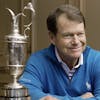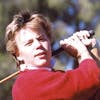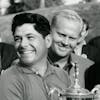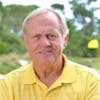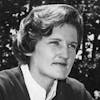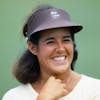Pat Hurst - Part 1 (The Early Years)
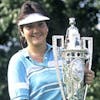
We embark on a journey through the remarkable career of major champion Pat Hurst. This is the first of a three-part series that dives deep into her life story, from her early college days to her triumphant entry into the professional golf world.
After learning the game at age 11, Pat quickly blossomed into an accomplished player, winning the 1986 U.S. Girls' Junior. Stakes us back to her college years at San Jose State, where her passion for the sport began to flourish. She shares heartwarming anecdotes of her time on the collegiate golf team, her close-knit friendships, and the joy of competing as a part of a team in an individual sport. And, as a college junior, she prevailed at the 1990 U.S. Women's Amateur.
As the conversation unfolds, we discover the pivotal moment when Pat faced a crossroads in her golfing journey. She candidly describes the tough decision to step away from the game she loved for an entire year, a hiatus that would later prove to be transformative.
Returning to the golf world as the teaching pro at La Quinta Country Club, Pat's story takes an unexpected turn. Her journey from teaching golf to becoming a professional player once again is filled with resilience, determination, and a rekindled love for the game.
Join us as Pat Hurst opens up about the challenges, the highs, and the lows she experienced during this pivotal period of her life. Her honesty and humility are truly inspiring as she reflects on her path from junior golfer to the professional circuit.
If you're a golf enthusiast or simply someone who appreciates stories of unwavering dedication and triumph over adversity, this episode is not to be missed. Pat Hurst's journey is a testament to the enduring spirit of the game, and it's just the beginning of her incredible tale. Stay tuned for Part 2, where we'll delve even deeper into her remarkable career, "FORE the Good of the Game."
Follow our show and/or leave a review/rating on:
Our Website https://www.forethegoodofthegame.com/reviews/new/
Apple Podcasts https://podcasts.apple.com/us/podcast/fore-the-good-of-the-game/id1562581853
Spotify Podcasts https://open.spotify.com/show/0XSuVGjwQg6bm78COkIhZO?si=b4c9d47ea8b24b2d
Google Podcasts https://podcasts.google.com/feed/aHR0cHM6Ly9mZWVkcy5idXp6c3Byb3V0LmNvbS8xNzM3Mjc1LnJzcw
About
"FORE the Good of the Game” is a golf podcast featuring interviews with World Golf Hall of Fame members, winners of major championships and other people of influence in and around the game of golf. Highlighting the positive aspects of the game, we aim to create and provide an engaging and timeless repository of content that listeners can enjoy now and forever. Co-hosted by PGA Tour star Bruce Devlin, our podcast focuses on telling their life stories, in their voices. Join Bruce and Mike Gonzalez “FORE the Good of the Game.”
Thanks so much for listening!
Music playing 00:00
Mike Gonzalez 00:15
Welcome to another edition of FORE the Good of the Game and Bruce Devlin, we're traveling out west to talk with today's major winner.
Devlin, Bruce 00:25
Yes and a great player with one major championship, 11 wins as a LPGA player, six on the tour. And it is indeed a pleasure to welcome this young lady. Mike. This is one of the youngest women we've ever interviewed, 54 year old Pat Hurst. Thank you, Pat for being with Mike and I we've looked forward to this and I hope you have some fun telling your story today.
Hurst, Pat 00:55
I definitely will have a lot of fun. Thanks, guys. I appreciate it.
Mike Gonzalez 00:58
Pat, so great to have you. I guess we should also mention Solheim Cup Captain multiple Solheim Cup player, we're going to get into all of that today. As you probably know, having talked a little bit about what we do with these great golfers of the past is, we're here to tell your story. And we always start right at the beginning. So we know you were born in San Leandro, and probably spent much of your time in the Bay Area, but just tell us a little bit about life growing up in California.
Hurst, Pat 01:29
Yeah, you know, I was, I was born in 1969. What a great year. And, you know, was here in San Leandro, which is not too far from where I reside now in Danville. It's about a half an hour away. And, you know, California has always been close to my heart. And I think I'll always be here for the rest of my life, because I just love it. But I am, you know, I have a brother, older brother, and my mom had met my dad over in Japan. And she moved here to California, not really knowing the language, my dad was in the military, in the Air Force. And anyways, they got married and had us and so he sadly passed away when I was two and a half. So mom decided, you know, I came over to America, I'm going to, you know, I was going to have a family. I'm still gonna raise my family here, even though she again, she didn't really know the language very well. But she wanted to stay here because that's the decision that she made. So it's a good decision for me. You know, and like I said, I'll always be a California girl, and I just love it here.
Mike Gonzalez 02:47
So your mom was of Japanese descent, your father was a U.S. resident in the military. Had to be a tough decision for your mom back then young mother, I guess two children. You know, having you know, just your father passed away when you were two. So she wasn't here all that long. And strange place still probably still learning the language had to be a real, real tough decision.
Hurst, Pat 03:15
Yeah, I think it was, but, you know, like, she was really, really close with her mom. So it was a tough decision for her to leave. But she, you know, fallen in love. And so when you got to kind of follow that, right, yeah. And so, but like, since she made that she's, you know, my mom, I think that I have a lot of my mom's qualities where she's, she's tough. And she's, she's resilient. She is going to do what she needs to do. And once she makes a decision, she sticks with it. And so, you know, we, you know, again, mom passed away I think it was in 2017 but she was the strongest woman that I've that I've ever known. And so it's it's she's, like said, I think I followed in her footsteps a little bit in that sense. And my daughter's the same way she's a tough cookie. So you know, these, these women, you don't want to fool around with us.
Mike Gonzalez 04:14
So your mom's name was?
Hurst, Pat 04:17
Kyoko Hurst or Kyoko Bundt, but she she remarried later on. So,
Mike Gonzalez 04:22
And your and your father's name was?
Hurst, Pat 04:25
Ezekiel Z. Hurst so it's weird because I hardly talk about him and I hardly ever talk about mom passing away. So it's a little bit different from me.
Mike Gonzalez 04:37
Well yeah, I mean, as you said, you really never got to know your dad did you?
Hurst, Pat 04:41
No, you know, I actually, one time I was playing, so he was buried up in Portland because he was in the military. That was the plot that was open closest to us at the time was it was up in Portland. So you know, I had mom come out when I was playing in Portland and we actually went, went out to the cemetery and, you know, she, she didn't get to see where he was buried when that happened. So it was kind of nice for just her and I need to be there. My brother wasn't there, but it was nice for us to be there. And it was kind of a weird moment. Because once we got to his grave, taps started playing for another funeral in the cemetery. So it was kind of, you know, just like said, this kind of stuff I don't ever talk about I don't think I've told many people that but it was kind of, you know, it was nice for me to be there and mom to come in for us to go see, you know, she didn't think that she would ever see that. And so that was kind of nice.
Mike Gonzalez 05:50
I'll just tell you a very quick story. We were in Italy, in Florence, Italy, in 2000. And I had found out that my uncle, my oldest uncle, who was killed in World War II was buried in the National Cemetery, the American Cemetery in Florence, right. So as a family, my wife and I, my two daughters went to visit his grave site. No family member had ever been to his gravesite.
Hurst, Pat 06:14
Right, yeah. Yeah.
Mike Gonzalez 06:16
The emotion that I felt approaching that tombstone was palpable. And I'm sure you experienced the same thing.
Hurst, Pat 06:25
Yeah, it was, you know, like said, I don't know. It's just a time for you know, to I don't know, talk and and tell them your story. Right. So it was kind of cool.
Mike Gonzalez 06:37
Yeah. So were your parents athletes, golfers at all?
Hurst, Pat 06:41
No, mom wasn't a golfer dad, like said dad and don't really know, don't know much about him. Because mom didn't really know the family. She knew. I think one of I don't even know how many brothers and sisters he had. So I don't know much about my real dad. But my stepdad is the one that plays golf. And he's the one that kind of got me into the game. And, he's 88 now still, still around with us. And so he used to play Oh, my goodness, it was like, every day, he'd come home. And he would, you know, go to the Golf Course. And and even to this day, I play, you know, when I get out and play my skin's games, or what have you, some of the guys that are still playing the skins games are guys that played with him. So this golf it's been great. And it's such a small world, right. And so we can talk about, you know, Frank, Frank Bundt is my is my stepdad we can talk about guys from, you know, 40 years ago, when I was 10, 11 years old, when I would go out with him, you know, on the golf cart and drive the golf cart while he's playing. And he's playing with these, these kids at that time, right. And we still talk about the different guys that I play with. And you know, Hey, I saw so and so today. And so we just kind of get caught up and I let him know how everybody's doing.
Devlin, Bruce 08:04
You started at 11, right Pat at about 11 years old, when you first saw what a golf course was?
Hurst, Pat 08:11
Well, I saw what a Golf Course was when I was probably I don't know, let's just go back maybe a couple years, nine or 10 years old when like I said, I would ride around the golf cart with Frank and just I love being outside love just, you know, being outdoors, and I would go look for golf balls while he's playing. And I would drive the golf cart. So that was a lot of fun. When you're that age,
Devlin, Bruce 08:32
I'll say
Mike Gonzalez 08:35
Plenty of stories, probably of all these kids driving golf carts and maybe getting into a little trouble.
Hurst, Pat 08:42
We had some. It taught me how to drive a car. Let's put it that way. And I feel very confident driving a car.
Mike Gonzalez 08:52
Did you ever caddy?
Hurst, Pat 08:54
No. Well, no, not back then. No, every now and then I'll go out and caddy for friends. But nothing. No.
Mike Gonzalez 09:04
So tell us about that moment when you were asked or encouraged to pick up a club and take your first swing.
Hurst, Pat 09:11
Yeah, so you know, like I said, I go in look for golf balls all the time. And so when Frank was out would be out playing and then I have four or five golf balls that I find and, and I'd say, you know, Can I hit one you know, and so he'd let me take his golf club and hit and that's it kind of got me wanting to play the game, right? I was athletic at the time. And so I would just bug mom and Frank Hey, you know, I want to get lessons. I want to get lessons and that's how basically I started the game is is is through that, you know ball hacking, driving the golf cart. And so I took lessons from Gloria Armstrong who you know, she played out she played on the tour back in the day. Back in the 50's, 60's and she helped me with my game she taught. She was she learned to teach the game from I guess it was Davis Love's his dad. You know, Gloria was my instructor for a good 15 years. So, and she taught, you know, she told me all about the tour and how they would travel around and caravan and oh my goodness, play cards and gamble and all things that I love to do. How about golf clubs? How did we get the first golf clubs. that were made for Pat. Okay, first golf clubs. So I would you know, there was probably seven or eight of us junior golfers out at this Golf Course set in Hayward called Sky West. It's no longer around. But it was a public Golf Course by the Hayward Airport and a guy Curly, his last name was Roberson. It wasn't Robertson, Roberson and Curly was an older guy who would do the the club prepare for the course in so you know, at that time, right, it was woods. And we would have to, you know, in order for us to play, we would have to have to earn our keep. So we would we, you know, put grips on, you know, take the grips off put grips on we're refinished golf clubs, got a dip it you know, kind of stain it dip it Yeah.
Mike Gonzalez 11:40
Did you do the the winding on woods.
Hurst, Pat 11:43
The whipping, yeah you've got to do the whipping? Yeah, tap it. Yeah, like we had to do it all. But Curly, he just had a whole bunch of extra clubs. And so I couldn't tell you what my clubs were, I know my woods. My driver and three would were Marilyn Smith's, that I refinished to burgundy color. I don't know what they originally were, but I refinished them to burgundy. You know, we had to do the etching. My brother and mmy cousin were really good at the etching. And Curly, cut them down. I had a 3, 5, 7, and nine irons and a Bullseye putter. And that was you know, and that was? Yeah, that was the that was he set me up with. And the Golf Course allowed us to., if we wanted to hit balls, we'd go down the tree line with the shag bag on the range, pick up balls, and there was you know, it's not as busy as it is today. But we can go out and play. One, two and three would come right back. Number three would come right back to the clubhouse. So in the afternoons we got in play and I mean it was just that's how I got my golf clubs. And that's how I started my game.
Mike Gonzalez 13:00
Were you ever able to tell Marilyn Smith that story of which woods you first hit?
Hurst, Pat 13:05
No, I wish I you know wish I did. But no.
Mike Gonzalez 13:08
Well, Bruce, most kids nowadays, they have no idea what owning a shag bag and having your own shag balls are and picking them up yourself. Right?
Devlin, Bruce 13:18
Got no idea? No earthly idea, would they?
Hurst, Pat 13:22
That's called discipline. That's discipline.
Mike Gonzalez 13:25
Yeah.
Devlin, Bruce 13:26
So you went from 11 years old to I guess you were what 17 when you first went and played in the U.S. Girls Junior?
Hurst, Pat 13:38
I was probably 16 was my first. I played in two I want to say so the second one I had won.
Devlin, Bruce 13:45
Maybe 16 when you played in the first one?
Hurst, Pat 13:48
Correct? Yep. And I played over, you know, never really flew. I think I flew out of state when I was 15 the first time but when I was 16 it was in Pennsylvania. And I made match play, but I can't tell you what I did after that. I guess that's that senior moments when you can't remember. But I remember playing really well. The first Junior, I was coming down the stretch, I was four under going into 17 on the second round. And I five-putted
Devlin, Bruce 14:22
Oh
Hurst, Pat 14:22
yeah, yeah, I kept just kept missing and missing and missing. Oh, yeah. Golf is very humbling.
Mike Gonzalez 14:31
Did you ever five-putt as a pro?
Hurst, Pat 14:35
No. No.
Mike Gonzalez 14:37
Four-putt?
Devlin, Bruce 14:40
Probably. Probably.
Hurst, Pat 14:43
But you know what, we don't want to remember those damn things do we? Yeah, I don't recall. I may have. You know what I did? I did in Sacramento I want to say. Coming down the stretch. I think it was a four-putt, but let's not talk about those good old days, right.
Mike Gonzalez 15:08
So, 1985, that was the Girls Junior at St. Clair Country Club in Pittsburgh, Pennsylvania, right.
Hurst, Pat 15:16
Correct. Yes. That was my first U.S. Juniors.
Mike Gonzalez 15:20
So you came out of there. And you said, well, Gloria has prepared me well, I think maybe I can play with these girls. Let's give it another go in 1986 and so what do you do? You go out to you go to Peach Tree Golf and Country Club
Hurst, Pat 15:36
In Marysville, California
Mike Gonzalez 15:38
and get her done.
Hurst, Pat 15:39
I did I got I got her done. And that was, you know, that was a lot of fun. You know, that was the start of of many good things. Right? I just it's it's a you know what, you know, I'll tell you a weird story. So I had qualified for the U.S. Amateur that year, you know, we had a qualifier I qualified. But, come Sunday, I think whatever the final day was, it had to been a Sunday, right? So come Sunday. A USGA officials said, okay, you've qualified for the U.S. Amateur. Do you still want to play? Mind you? This is before I even go up? And I'm like, no, no, I don't want to play. So what did she do? She withdraws me out of the UI.S. Amateur. So I didn't play the U.S. AM after qualifying, which was down the road at Pasatiempo. I get there and I'm, I get there and I ended up Caddying for Dina Ammaccapane, because I was not in the event. Yeah, I was not in the event. So how would that and you know, it is what it is. And I can't tell you who it was. I you know, at that time, I didn't know. I didn't travel much I didn't travel. We had a great junior golf program in Northern California. And we probably had my goodness 10 to 15 of us Junior girls that were really tight. And I just you know, I didn't have to travel very much to have great competition.
Mike Gonzalez 17:17
Well, you know what's really cool, you've and you've probably done this you can go to far Hills, New Jersey now to the USGA Museum and look on those championship boards and see 1986 U.S. Girls Junior Champion, Pat Hurst. That's pretty cool.
Hurst, Pat 17:33
Yeah. Yeah. You know, I haven't been haven't done that yet. But I do want to I do want to do that one day. But are they moving to? Are they going to be moving to Pinehurst?
Devlin, Bruce 17:42
Yes.
Mike Gonzalez 17:43
So the World Golf Hall of Fame which was in St. Augustine, right. Okay. That's the thing that's moving, along with some USGA functions, into a new facility in Pinehurst. The USGA Museum will continue to be in Far Hills. Okay. All right. Yeah. But the World Golf Hall of Fame Museum will be now located in Pinehurst.
Hurst, Pat 18:06
Got it. Okay. That's good info.
Mike Gonzalez 18:08
Yeah. And I think that's gonna open around the grand opening, I think inandthe induction for the next class will be like the Tuesday or Monday of U.S. Open week next year.
Hurst, Pat 18:20
Okay. Okay, so, yeah, coming up.
Mike Gonzalez 18:23
So Adele Moore was the lady you beat in 20 holes. What do you recall about that competition, that match?
Hurst, Pat 18:32
Oh, I recall. You know, mom wasn't there. And I recall playing the 20th hole and getting done. And someone says, who's that? You know, they were pointing to this lady. I'm like, oh, that's my mom. And you know, you're kind of riding a high dand you just got done playing 20 holes, and you just don't know what, what just happened, right? It was like, and of course my mom, and I just I just kept crying like, that's my mom. I'm like, Mom, what? How long have you she was out there the whole day. Gloria had told her you need to go this is something big. You know, mom was never into golf. And so. So she's like, Okay, I'll go and so thank God, she came. I was driving back home. And I remember I was super tired. So I finally just pulled over near near Sacramento, I pulled over and she was behind me. So she pulls over and I set my I'm too tired to drive. So we left the car and we drove home in limp back then, whether I think it was the next day or two days later to go pick the car but I was just thank God she had come right or I don't know what I would have been. But yeah, so that is the one thing that I remember that she said she hid behind The trees, and I can just see my mom doing that right not wanting to bother, mom was just the sweetest thing and never, you know, didn't want to bother me and just put she wanted to be there so, that was really cool.
Mike Gonzalez 20:12
Well, that's neat. So how important was it at that young of an age to learn how to win?
Hurst, Pat 20:20
Yeah, you know, I didn't realize, you know, looking back at the time, it was for me, it was just another tournament, I'm playing in Northern California. It's just another tournament. Like, so we played with, we had a lot of good competition back then in junior golf, that you just, it was just normal, right? The competition because we play with the same girls every week-in, and week-out week-in and week-out. None of us really traveled. But you know, it's like, super expensive to travel and we didn't have the money and we didn't need to, you know, we had the really good competition, I'd say, you know, probably, I mean, I can count, you know, you know, one girl went to SC, you know, all the girls that went on for rights SC, UCLA, two to Hawaii, San Jose State two of us, TCU you know, so I mean, we had really good competition that the girls were good. And I didn't realize, I just felt like I was playing with, with the girls. And so I think growing up playing junior golf in Northern California, that kind of prepared me more than anything else in the world, more than more than just that one event, I think just leading up to it. And playing every week-in and week-out.
Mike Gonzalez 21:41
So who would be some of the names that our listeners might recognize from?
Hurst, Pat 21:47
Oh, back then when you know, you're talking about the girls that went on full rides. It was Joan _____ was really at the time she was, you know, qualify for everything for the U.S. Am. the U.S. Open. You know, since she was it felt like since she was 14 or 15. She's no longer playing, but I grew up with Denise Philbrick who her and I both made it out on tour the same year she actually won Tour school, the year that we went out in her and I started golf at the same time at Sky West together and had Gloria as our instructor and we were roommates in college and so I had Denise and now she's you know she's teaching Jean _____ went to UCLA, she actually ended up caddying for me at the U.S. Am when I won. you know, we're staying together and she had lost her match. And so she started caddying for me at the end, trying to think there's a Dana Arnold and I travel with the Arnold's quite a bit. And Dana played really well last year at the U.S. Seniors, not this year, but last year, and her and her sister Dana was it's Dana Webster, but it was Dana Arnold and then Carrie Arnold who's now shoot, I don't know what her last name is now, but it was Carrie Arnold. And so there's just I mean, there was a lot of us that played and you know, making it out on tour. Dana didn't really make it out there. Like I said Denise did, Carrie did. Joan. I don't know what happened to Joan how she didn't make it because she was the one that was the one. She was but she didn't really make it. So there was there was a whole bunch of us but we're all a lot of us are still in golf. Yeah. That's kind of cool.
Devlin, Bruce 23:40
So, you found some pretty good players when you went to San Jose State University. Right? You had some pretty good teammates there. Tell us about them.
Hurst, Pat 23:52
Well, I had, you know, I never played in play with Juli or Patty who were the the other two that were probably the names that people would know played with Dana Dorman who is now the head coach at San Jose State. I you know, when we won nationals again, it was Denise Philbrick, who was the girl that I grew up playing with and Dino Ammaccapane was on the team. Even though there was a Henrietta Hustler was on the team from England. Yes, you gotta love that. So Henrietta was on the team, and it was, you know, again, it was right down the street from us at Stanford. So it was kind of cool. It was close to home when we won nationals and, you know, not only winning the individual part, but winning the team part and how everyone got to experience the same feelings that I was experiencing at the time was a lot of fun for me and and it you know, it's close to my heart, right? I mean, it's just, everybody was are all in the same boat that week?
Mike Gonzalez 25:03
I think a lot of our players went if they played college, because as you can appreciate a lot of the older ladies we've talked about, there wasn't an opportunity, right before Title Nine. Right? Often times, their schools didn't even have a women's golf program they might have played on the men's team. But for those that had that experience, it almost seems as though the team experience they had was even more fun than any individual success they had.
Hurst, Pat 25:32
Yeah, it was the best. I mean, we had so much fun. And we got along well with the men's golf team. And I still to this day, talk to some, you know, some of the guys that played on the men's team, so it was it. It was a lot of fun. You know, I have to say, I went on the Juli Inkster scholarship. So if you talk to her, she's gonna tell you that I'm still on scholarship. So pretty darn good scholarship to be on, because it's a lifetime thing. So that was, you know, something that you know, again, I can't I, you know, what that meant to me was a lot right in, in our friendship and in even to this day, you know, we're really close. So that's it's been, it's been really cool. San Jose has been really good to me.
Mike Gonzalez 26:20
You mentioned a couple of their more famous alums, and that being Juli Inkster and Patty Sheehan, I think they were together in school for overlapped a bit. And I think they probably won a championship during their time as well, didn't they?
Hurst, Pat 26:33
You know what? I don't they didn't. I don't, they weren't in the NCAA's. They were. What was it AWIA I don't know what it was AWIA something like that. Right?
Mike Gonzalez 26:44
There was different acronyms back then before it was the NCAA's, yeah.
Hurst, Pat 26:48
Right, so I don't know if they had won, but I know that San Jose won the national championship in 87. So the year we'll see, they wouldn't 86, 87 They won the year before I got there. And then we won in 1989 and then we won in 1992. We lost in a playoff and 1991. But Coach, I mean, with the three teams that he won the national championship, not one repeat player. So he obviously did something well, you know, with his recruiting, his recruiting, it's obviously really good. So yeah, I totally enjoyed playing for our Coach.
Mike Gonzalez 27:34
So tell us about the decision. Your college decision? Were you recruited by many schools? Were you looking at different options?
Hurst, Pat 27:42
Yeah, you know, I I still have some letters from some of the coaches which I don't think they were supposed to do but they did and in I like said I think it's still at Mom's but I always wanted I'm a homebody and wanted to stay at home want to go to San Jose. And got that opportunity right right away. So didn't go on any recruiting trips other than San Jose and didn't want to entertain anything else because that's what I knew what I wanted to do. I wanted to be here and be close to home.
Mike Gonzalez 28:20
Yeah, well, yeah. You had great success there. As you mentioned winning the the team and the individual title at the NCAA is in 1989 You were first team All-American couple of times 1989 and 1990. You get the Handa Award for best collegiate golfer course you've had a pretty good success there. You play in the Women's U.S. Amateur at Pinehurst in 1989 and did pretty well in stroke play didn't you?
Hurst, Pat 28:47
I did. Yeah, I did. And then lost that first round at Pinehurst, and, boy, I don't cry much but I think I did cry after that round when I was walking in. Then in 1990 I go to Canoebrook in Plainfield, New Jersey and get through the two qualifying rounds. Call. You know at that time you call in to find out your tee times. And I call in and when I call it in Pat Hurst, you know, whenever I shot and they said oh yeah, you're at 8:05 against and I can't remember the girl that I've lost to the year before. Same girl.
Mike Gonzalez 29:38
Oh my, what a great story
Hurst, Pat 29:39
First round. And I can't remember who it is. What are the right and I'm thinking No, no, no this year, you know? And then the person on the phone is probably going yeah, I'm looking at it right here. It's a you know, whatever time it was and I'm like no, no, you don't no. I'm talking about this year and sure enough, yep, I played against her, got my revenge and just kept going.
Mike Gonzalez 30:07
Yeah. So do you remember who the medalist was in 1990?
Hurst, Pat 30:11
Was it Brandie Burton or someone but
Mike Gonzalez 30:15
How about the lady that beat Brandie in the finals the previous year.
Hurst, Pat 30:18
Vicki
Mike Gonzalez 30:19
Yeah, Vicki Goetze
Hurst, Pat 30:20
Yeah. Vicki. So I don't know who one of them was the medalist and then the other one was the winner, right?
Mike Gonzalez 30:26
Yeah, so Vicki won in 1989 over Brandie four and three, and you were the medalist and then the following year, you beat Stephanie Davis 37 holes and Vicki Goetze is the medalist.
Hurst, Pat 30:37
Right, Isn't that funny? Yeah. I was just on the phone with her yesterday.
Mike Gonzalez 30:43
She had her chance because she had some success there as well, didn't she? Yes. Won it over Brandie, and I think won it again in 1992 over Annika Sorenstam.
Hurst, Pat 30:55
Oh, okay. Yeah. So yeah, that's that's I didn't know. That's good knowledge. Yeah. So what was during my fuzzy time? I think when she when she won that second one. First one wasn't
Mike Gonzalez 31:07
What was going on during your fuzzy time?
Hurst, Pat 31:11
Remember, that was a time where I put the clubs down. Was that around that time. Yeah. So I totally shut out golf as you can tell.
Mike Gonzalez 31:22
Junior Champion, big deal. Women's Amateur champion, bigger deal.
Devlin, Bruce 31:28
Bigger Deal, yeah.
Hurst, Pat 31:30
Yeah, yeah.
Devlin, Bruce 31:31
Then you got to play in the Espirito Santo in 1990. Right.
Hurst, Pat 31:36
I did, played with Vicki
Devlin, Bruce 31:39
And you did a little traveling to get there. Right. Went to New Zealand.
Hurst, Pat 31:43
Yes. And that was a lot of fun. It was Vicki and I and Karen Noble. And that one my goodness. You talk about having so much fun. We Katherine Graham, I don't know if you know who Katherine Graham is. But she was our
Mike Gonzalez 31:58
I remember the opera singer Katherine Graham.
Hurst, Pat 32:00
No, no, that wasn't her. Katherine Graham was our captain. And she was a hoot. We had so much fun. It was a lot of fun. But we ended up going to New Zealand. You know, a quick story where? You know, we're the U.S .team and they give us all our own rooms. Well, mind you were really young. And I'm not used to staying by myself. And we meet with Katherine, you know, we go to our rooms, put everything down. Meet Katherine in a room and she says, How's your guys's rooms? And I said, Well, I'm kind of down the hallway. So I'm not used to that. I you know, ifsomeone has another bed? I would? Yes. So ended up. I don't I think Vicki and I were in one room. Karen was in the other room. And we had the door that we can open up. So we were all, Oh my goodness. We had the best time but you should, our room was a total disaster. Disaster. There was. Right, three of us. Well, like three of us because we have the connecting rooms. Oh my god, we had so much fun. And played this year at the U.S. Senior Open, Mike where I met you. And I played my practice round with Karen Noble and we couldn't smile and talk enough about how much fun we had.
Mike Gonzalez 33:29
That's great. Well, that was the you know, for our listeners that maybe not familiar with that event. The Estpirito Santo to trophy was first contested in 1964, basically the World Team amateur event for women. The men's version of that, of course, was kicked off six years earlier. And the fella on your screen. I'm talking about the older fellow. The real old fella Played in that inaugural Eisenhower Trophy at the Old Course in 1958.
Hurst, Pat 34:04
That's awesome. Awesome.
Devlin, Bruce 34:06
Yeah and the Aussies beat the Americans in a playoff.
Hurst, Pat 34:11
Oh, come on.
Devlin, Bruce 34:12
Yeah. And that old guy on the screen was the medalist.
Mike Gonzalez 34:17
Bruce was the medalist.
Hurst, Pat 34:18
Nice. Good job. I think Vicki was our medalist.
Mike Gonzalez 34:22
Yeah, I think I think she was I think she won it as the individual. you were T-4 with Ms. Sorenstam
Hurst, Pat 34:31
I don't remember that? Oh, yeah. Well, who's that. And Team USA won right. Yeah, I think we won by quite a bit I think didn't we?
Devlin, Bruce 34:43
Not sure by how many?
Mike Gonzalez 34:45
Yeah, I don't remember how many but it was a victory for you guys as it was for Australia. You mentioned going to New Zealand for this competition. There was another young fella from New Zealand that played in that inaugural Eisenhower trophy with Bruce on the New Zealand team.
Hurst, Pat 35:00
Who would it be?
Devlin, Bruce 35:03
Sir Bob Charles?
Hurst, Pat 35:06
Oh, got it.
Devlin, Bruce 35:07
1963 Open champion.
Hurst, Pat 35:10
Yeah. Yeah. See? Cool, isn't it? It's so much fun.
Mike Gonzalez 35:14
Some great, great experiences in your amateur days, particularly with the team play.
Hurst, Pat 35:21
Yes, exactly. It was. And it's a lot of fun. I mean, nothing's better than playing team play in an individual sport.
Mike Gonzalez 35:30
At some point your games developing, I assume you're still working with Gloria. And when did you start thinking about doing this for a living?
Hurst, Pat 35:40
Oh, you know, I don't know. I mean, in 91, I wasn't an All American. My senior year was an All-American because I didn't. I didn't play enough rounds, you know, played in some. I played in Dinah Shore. That year, I played a couple different events, we went over to to Japan and played and so I didn't, didn't have enough rounds to qualify for an All-American. So I missed that in 91. But, you know, it was always the next step. It was it was it was always the next step. But then I go to Q school, I had some boy, I had a lot of health issues from, I'd say it was his senior year in high school, all the way until I had my colon removed. my large intestine removed in probably about 10 years ago. So I'll be up until you know, so I always had some granted, that's probably why I want to stay close to home. It was comfortable. But I had played some some mini-tour events, I missed the first Q school. Then, was going to go to the second Q school I was in Monterey caddying for my husband. Now husband, he was my boyfriend at the time. And and I was like, I love Monterey. I love being you know, around here. What am I doing? I don't want to go to Q School. You know, what? Why am I hating golf right now. And so that on top of I just got done playing in mini tour event. And I was, you know, I was probably I don't know how many over five shots going into last round. And I didn't want to play because I just wasn't feeling good. And I just I but I went and played, you know, won the event. And, again, then went to Monterrey and I'm like, You know what, I don't know if I want to do this. I don't know if I can hit you know, in your mind is just working. And finally, we get done. I said to my husband said, Honey, I don't know if I want to go to Q school. And he's just like, well then don't go if you don't want to go don't go and and I'm like, okay, so when I got home, it's a two hour drive out, you know, hour and 45 minutes and I get home when I tell I got home I said to mom and Frank. So you know, I think I'm not going to go to Q school. And, you know, I can my mom's the sweetest thing. She's like, Honey, if you don't want to do it, Honey, don't do it. You know, she's like, it's okay. And I said no, you don't understand I might quit golf forever, like and I think it was a bigger thing to me than it was to them right? They just want you happy as as your parents in but I thought that I'd be letting them down. And I had another another couple that is was really close to me that kind of was really involved in my golf and I called called up Bruce and I said the same thing. I said listen, I don't think I'm gonna go to Q school. And he's a successful business guy and he's like, You know what, honey, if you don't want to put in 100% don't do it. Like seriously, is it this easy? And so sure enough, I put my clubs down for about a year I didn't touch a club and Jeff went to Northridge my husband went to Northridge and I got a job you know, I was looking for a job here I didn't graduate from San Jose State. Worst decision of my life, you know not you know thinking that you've got that path of professional golf and all of a sudden now it's not there. Next you know I got a call from from Bruce saying hey the teaching pro at LaQuinta Country Club, Laura, just got her card and he's like so that her jobs opening up if you if you want to send in a resume and I'm thinking okay seriously I love working don't get me wrong I love working in but I'm thinking teaching golf. Okay, now I gotta get back into this game. SoYou know, you mail in your resume. You don't. It's not on the computer. So i mailed it in he the head pro Jeff, it wasn't director of golf. It was the head pro right. And then you have the general manager and now you have the director of golf Not, not back then. But Jeff Jackson called me and he says, Can you come in for an interview? Sure. You know, and I again, I know nothing about teaching, I've had the same instructor my whole life. So I go down there. And I think, I don't know, I think I was a pretty confident, you know, girl where I can hold on, I can hold my own, you couldn't, couldn't get anything by me. And so I go down there, and I felt pretty confident. And sure enough, I get this job. Now I got it now I'm okay. It's not like I'm an Assistant. I'm the teaching pro at LaQuinta Country Club. And I'm like, Oh, my goodness, what am I doing? And, and then I also asked Jeff Jackson, if I said, Hey, you know, I'd love to work in the golf shop. Also just to get to know everything and get to know the members better. I was always I've always been the type that even in college, I worked even now I'm still working even. So ended up working there for two years, two years and started playing. Right. So one of my, one of my duties was to play Thursdays with the women. Well, here I hadn't touched a club for a year literally didn't touch a club. Jeff's going to school at Northridge. So what am I going to do when he's at school? Hey, we got him a job a big one. So he would come down on the weekends. But what am I, you know, what am I going to do during the week when he's not there? So I just start practicing and playing again. And I'm playing with the ladies on Thursdays, and then you start playing with the guys and now you start gambling. And now I'm playing in, you know,
Devlin, Bruce 41:43
The min-tours.
Hurst, Pat 41:45
Yeah, start playing the mini tours, and I ended up playing, you know, LaQuinta. It's what seasonal so we were done, I don't know, April, I think would be the the last the last month where we would all be there. And then everybody kind of goes everywhere else start in May. And played in so many tour events finished, I'd say top 10, my husband says top five the first one. And then I won the second one in in a seven or eight hole playoff. And then I lost the third one in on I think it was the second hole of a playoff. And went back to LaQuinta and Jeff Jackson says hey, if you want to go to Q school, you're more than welcome to go to Q school. You know, always have your job. Oh, okay. And now I'm getting the you know, you get the but you know, this, this damn game. You get the bug. And you know, I've got the bug again, and I want to compete and when you're competing, you just want to keep going. So sure enough, I went to Q school made it through Q school and you know, went out and played that first. So I went out played the first year on tour in 1995 was Rookie of the Year I came back to the LaQuinta, not woring as the teaching Pro that worked in the golf shop for $7.50 for the three months that I was off, because I just loved it and I love them. And I loved the members. I loved everybody I worked with. It was just it was a total comfortable thing for me and just like said I loved being there. And now guess what? I'm back there again as an honorary member and I'm loving it. Thank you for listening to another episode of FORE the Good of the Game. And please wherever you listen to your podcasts on Apple and Spotify if you like what you hear, please subscribe, spread the word and tell your friends . Until we tee it up again, FORE the Good of the Game, so long everybody.
Music playing 43:52
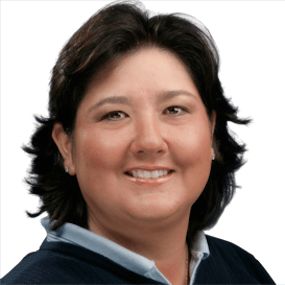
Hurst, Pat
Golf Professional
Two-time first-team All-American Pat Hurst competed for the San José State University women’s golf team during the 1988 through 1991 seasons.
With the last shot of the 1989 NCAA Division I Women’s Golf Championships, a three-foot par putt at the Stanford Golf Course’s 18th hole, San Jose State won the second of its three team championships in a five-year span (1987, 1989, 1992) and Hurst became the individual champion. The Spartans never finished lower than sixth place at an NCAA Championship with Hurst in the lineup. She won at least one tournament in each of her four seasons as a Spartan, and her eight tournament victories is fourth-best at San José State.
After completing her college career, Hurst joined the Ladies Professional Golf Association (LPGA) in 1995 and was the Tour’s Rookie of the Year. As a professional, she has six Tour victories including the 1998 Kraft Nabisco Championship – one of the LPGA’s four “major” championships. As of July 1, 2018, Hurst ranked 33rd on the LPGA career winnings list.
New to FORE the Good of the Game?
Here are some great episodes to start with. Or, check out episodes by topic.















